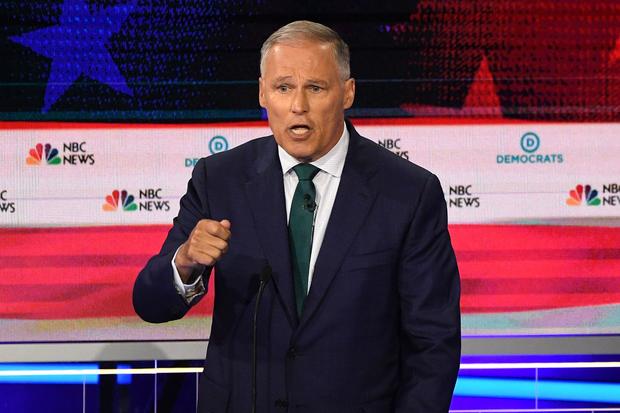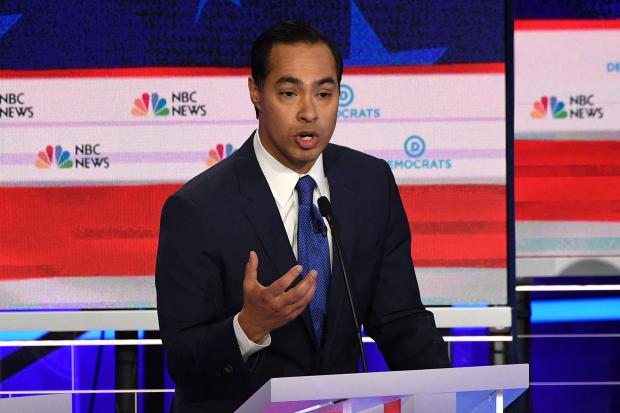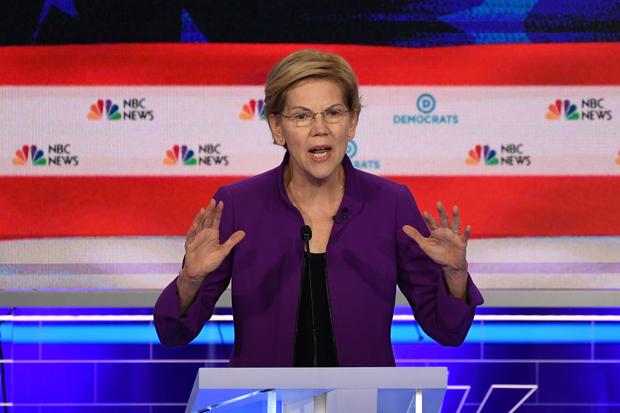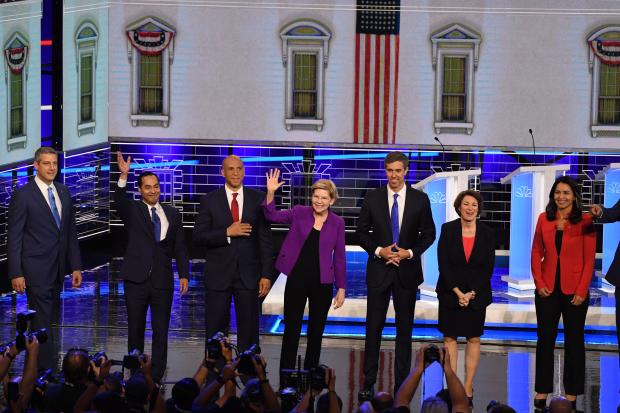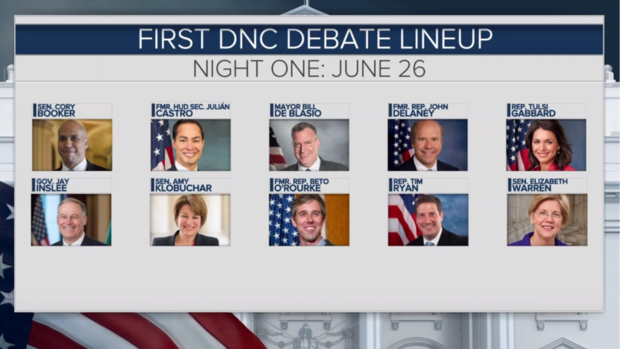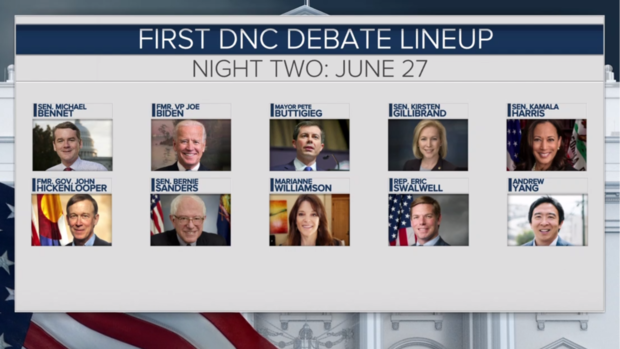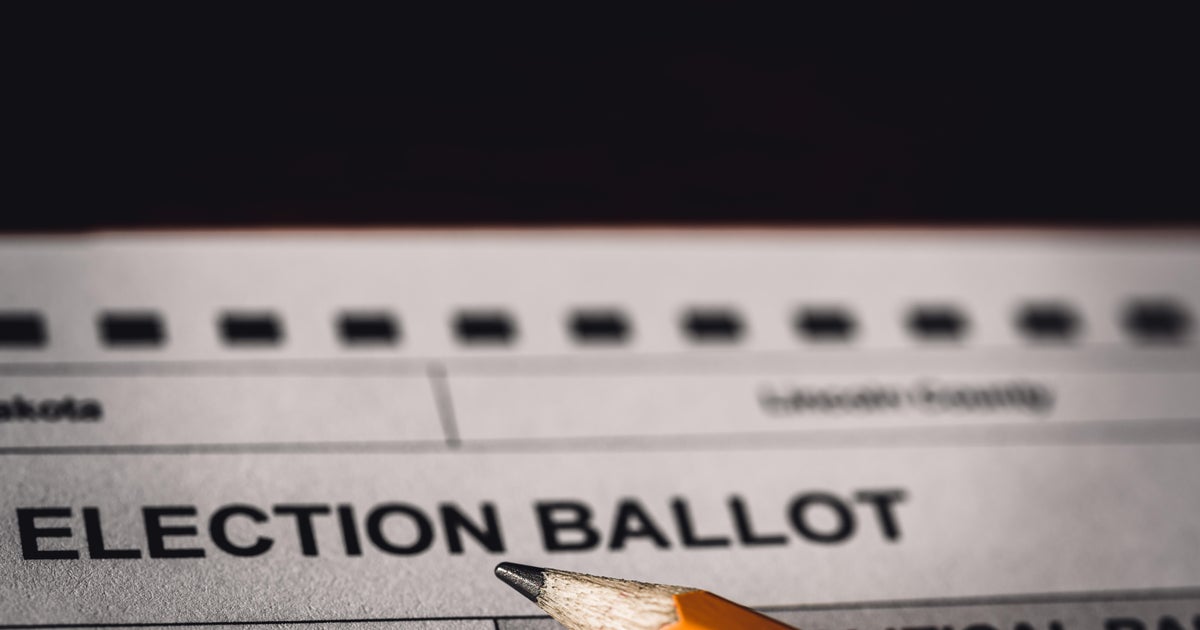Democratic candidates spar in first night of primary debates
Ten Democrats vying to be the next president sparred over issues like immigration and gun control in the policy-heavy first debate of the 2020 primary season, providing a glimpse at the issues that will define the race for the nomination over the months to come.
In the briskly paced debate, candidates explained their differences on health care, climate change and LGBTQ issues. The debate revealed some of the key differences between the candidates, who sometimes talked over each other while trying to make an impression on a crowded stage.
The candidates on the stage Wednesday night were Cory Booker, Bill de Blasio, Julián Castro, John Delaney, Tulsi Gabbard, Jay Inslee, Amy Klobuchar, Beto O'Rourke, Tim Ryan and Elizabeth Warren.
Although there was no clear standout in the debate, Elizabeth Warren, Cory Booker and Julián Castro received the most speaking time. In terms of questions, Booker, O'Rourke and Klobuchar each had eight directed to them, followed by Warren with seven and Castro with six.
The candidates did not fixate on President Trump, but his presence loomed over the stage, with each candidate using him as a foil to pitch their agendas. Senate Majority Leader Mitch McConnell was another Republican boogeyman on the debate stage.
Here are the key moments from the first Democratic primary debate. The second night of the debate will get underway Thursday night.
Watch CBSN for live coverage following the debate
Castro: "We will say adios to Donald Trump"
10:57 p.m.: In his closing statement, Castro took direct aim at the president.
"On January 20, 2021, we will say adios to Donald Trump," he said.
O'Rourke says his DOJ would decide "consequences" for Trump
10:44 p.m.: O'Rourke said House Democrats should initiate impeachment proceedings against the president immediately. But if the current Congress does not impeach Mr. Trump, the former Texas congressman vowed that if elected president, his Department of Justice would pursue the facts of special counsel Robert Mueller's report and ensure there are "consequences" for Mr. Trump's actions.
"If we allow him to get away with this with complete impunity, we will have set a new standard. And that is that some people, because of the position of power and public trust that they hold, are above the law," he said.
Mueller's report detailed several concerted efforts by Mr. Trump to thwart the special counsel's investigation into whether his campaign coordinated with the Russian government during the 2016 election.
Inslee says Trump is the "greatest threat" to U.S.
10:44 p.m.: When asked to name the greatest current geopolitical threat to the U.S., Inslee's response evoked some of the loudest applause of the night.
"The greatest threat to the security of the United States is Donald Trump," Inslee said.
He did not mention his signature issue, climate change -- although several other candidates said that the biggest geopolitical threat was climate change.
-- Grace Segers
De Blasio invokes father's memory when discussing international conflicts
10:36 p.m.: De Blasio said a president must have congressional approval before engaging in conflict overseas, even if it is responding to a genocide in another country.
De Blasio invoked his father's memory, noting that his father was a World War II veteran who suffered wounds both physical and mental, and ultimately took his own life.
Gabbard and Ryan also briefly sparred over American engagement in international conflicts, with Gabbard proposing a complete withdrawal from Afghanistan.
"If the United States isn't engaged, the Taliban will grow," Ryan said.
-- Grace Segers
Booker decries violence against black transgender Americans
10:30 p.m.: Booker spoke passionately about the need to protect the rights of LGBTQ individuals, and particularly transgender individuals, who face disproportionate levels of violence.
"We do not talk enough about trans Americans, especially African American trans Americans, and the incredibly high rates of murder right now," Booker said. "It's not enough just to be on the Equality Act -- I'm an original co-sponsor -- we need to have a president that will fight to protect LGBTQ Americans every day."
-- Grace Segers
Inslee calls for abolishing Senate filibuster to address climate change
10:24 p.m.: Asked how he would push his ambitious agenda to enact sweeping reforms designed to mitigate the effects of climate change, Inslee said it will be crucial to break Senate Majority Leader Mitch McConnell's hold on the Republican-led Senate.
"By taking away the filibuster from Mitch McConnell. To start this we have to do that," he said, referring to rules in the Senate that require most bills to be approved by a 60-vote majority.
Inslee, Washington's current governor, has made climate change the main agenda item on his campaign.
-- Camilo Montoya-Galvez
Warren says gun violence should be treated as a "national health emergency"
10:08 p.m.: Warren proposed confronting the epidemic of gun violence in the U.S., noting that children aren't just dying in mass shootings, but in everyday incidents of violence.
"Gun violence is a national health emergency in this country and we need to treat it like that," Warren said, adding that the U.S. needs to "double down on research" to find ways to address the problem.
She also shied away from saying the federal government should interfere with people's rights to own firearms, explaining that guns in the hands of an experienced gun collector were different from guns being used in mass shootings.
-- Grace Segers
Audio malfunction forces NBC to cut to commercial
10:03 p.m.: As soon as they returned from a break, "Meet the Press" moderator Chuck Todd and MSNBC host Rachel Maddow recognized that the debate team was having technical difficulties, as some microphones had not been turned off.
The awkward moment prompted the moderators to call for a short commercial break. The president took the opportunity to attack the network.
-- Camilo Montoya-Galvez
De Blasio, Delaney repeatedly interrupt — and get cut off
9:57 p.m.: De Blasio and Delaney, who have received few questions since the start of the debate, have repeatedly interrupted other candidates on the stage in an attempt to take control of the conversation.
However, the two are often cut off by moderators. When Delaney interrupted a discussion on immigration, moderator Lester Holt told him that they were switching gears to talk about Iran. When de Blasio tried to talk about Iran, moderator Savannah Guthrie informed him that it was time for a commercial break.
-- Grace Segers
Booker says he wouldn't have signed 2015 Iran nuclear deal
9:50 p.m.: Booker was the only candidate who did not raise his hand when asked which candidates would have signed onto the 2015 Iran nuclear deal as written.
Booker said it was a mistake to leave the deal, but that he would not necessarily rejoin the deal negotiated by Iran and several other countries during the Obama administration.
-- Grace Segers
De Blasio to struggling Americans: "Immigrants didn't do that to you!"
9:41 p.m.: Despite not being asked about the issue directly, de Blasio interjected a conversation to say Democrats' messaging on immigration should focus on making sure struggling Americans understand that immigrants are not the culprits of their economic woes.
"Immigrants didn't do that to you! The big corporations did that to you. The 1% did that to you," he said.
The mayor of New York, home to one of the largest immigrant communities in the U.S., said his party should do everything they can to condemn Mr. Trump's hardline immigration agenda -- which he suggested the president employs out of political expediency.
-- Camilo Montoya-Galvez
Castro and O'Rourke spar over decriminalization of border crossing
9:41 p.m.: As O'Rourke answered his first question on immigration, Castro interrupted him several times over his position on the decriminalization of illegal border crossings -- which hit a 13-year monthly high in May.
Unlike Warren and Castro -- who have called for the decriminalization of crossing the border illegally -- O'Rourke's immigration platform does not include such a proposal, which would overhaul U.S. immigration law. And Castro pressed him hard on the issue.
The former Obama cabinet official said the Trump administration is using laws on the books that criminalize border crossings to incarcerate migrant parents and separate them from their children. He called out O'Rourke, who represented a Texas border district in Congress, for not "doing his homework" on immigration.
-- Camilo Montoya-Galvez
Castro: Situation at border should "piss us all off"
9:39 p.m.: Discussing a photo published this week of a migrant father and his young daughter facedown in a river, having drowned attempting to cross into the U.S., Castro said the photo should "spur us to action" and "piss us all off."
Castro said that on his first day as president, he would sign an executive order to end the zero tolerance policy, the Remain in Mexico policy, and the metering policy. He also said he would support a new "Marshall Plan" for Guatemala, Honduras and El Salvador, to address the situations in those countries which lead migrants to attempt the dangerous route to enter the U.S.
-- Grace Segers
Trump weighs in from Air Force One
Klobuchar hits Inslee on reproductive rights
9:28 p.m.: Inslee touted his record as a governor signing laws which protect a woman's abortion rights and provide a public health care option.
"We have one candidate who's actually advanced the ball," Inslee said, referring to himself.
Klobuchar disagreed with Inslee's characterization that he was the only one on stage who had worked to support a woman's right to an abortion.
"There's three women up here that have fought pretty hard for a woman's right to choose," Klobuchar said, to cheers.
-- Grace Segers
De Blasio, Delaney interrupt O'Rourke on health care
9:24 p.m.: O'Rourke's promise that he would not eliminate private insurance was quickly met with derision from de Blasio, who interrupted to say that private insurance was "not working." Like Warren, de Blasio also supports "Medicare for All."
However, Delaney quickly jumped in to speak over de Blasio, defending Americans' rights to keep their private insurance if they desire.
"I think we should be the party that keeps what's working and fixes what's broken," Delaney said.
Gabbard and Booker also defended "Medicare for All" against critics when prompted by moderators.
-- Grace Segers
Warren: "I'm with Bernie on 'Medicare for All'"
9:21 p.m.: Answering her third question of the night, Warren reiterated her strong support for "Medicare for All," the bold progressive proposal to revamp the nation's health care system with a single-payer program.
Praising her progressive rival Sanders for spearheading the plan in Congress, she said the chief objective of giant health care companies is to spend "as few dollars as possible" for the medical care of Americans.
-- Camilo Montoya-Galvez
Castro says passing the Equal Rights Amendment would be a priority
9:12 p.m.: When asked how he would work to mitigate the gender pay gap, Castro discussed his history as the son of a single mother.
"I would do several things, starting with something we should have done a long time ago, which is to pass the Equal Rights Amendment," Castro said, to cheers and applause. He also said that he would support additional legislation related to the gender pay gap.
-- Grace Segers
In Spanish, O'Rourke says U.S. democracy should "listen to all voices"
9:07 p.m.: O'Rourke was the first candidate to tout his fluency in Spanish, which Booker also learned while studying abroad. In Spanish, the former Texas congressman said a stable American democracy should "listen to all voices."
Pressed by the moderators to explicitly indicate whether he supports a marginal tax on the wealthy, O'Rourke relied on a generic answer.
"I would support a tax code that is fair for everyone," he said.
-- Camilo Montoya-Galvez
Warren kicks off debate by discussing "need for structural change" in economy
9:03 p.m.: Warren received the first question of the night. She was asked why her campaign was so focused on reforming the economy if the economy was doing relatively well under President Trump.
"Who is this economy really working for?" Warren responded. "It's doing great for a thinner and thinner slice at the top."
Warren said that the economy was "doing great" for giant drug companies, oil companies, and those who would invest in private prisons.
"When you've got a government, when you've got an economy, that does great for those with money and isn't doing great for everyone else, that is corruption, pure and simple," Warren said.
-- Grace Segers
Candidates take the stage in Miami
8:55 p.m.: The 10 candidates participating in tonight's debate took the stage shortly before it began, with Warren and O'Rourke in the middle. The placement of the candidates was determined by their standing in polls.
-- Stefan Becket
Trump urges debate watchers to follow his campaign team
Tweeting from Air Force One en route to the G20 summit in Osaka, Japan, President Trump urged debate watchers to follow members of his campaign team for "FACT CHECKING." Mr. Trump indicated that he would not be live-tweeting the debate, as he is "off to save the Free World."
"For tonight's #DemDebate, be sure to follow @TeamTrump, @TrumpWarRoom, @Parscale, @KayleighMcEnany, @TimMurtaugh, and @Marc_Lotter for RAPID RESPONSE, FACT CHECKING, and the TRUTH! #MAGA #KAG Sorry, I'm on Air Force One, off to save the Free World!" Mr. Trump wrote.
Facts behind key issues likely to come up in the debate
The 20 presidential candidates set to kick off two nights of debates as part of the 2020 Democratic primary season will need sharp elbows -- and tongues -- to stand out in the jam-packed field. Expect much of the discussion to focus on the U.S. economy, especially kitchen-table matters such as jobs, taxes and health care.
Read the facts behind some of the key issues that are likely to come up here.
DNC chair: "There will be no one talking about hand sizes" at debate
Democratic National Committee Chairman Tom Perez spoke to reporters before the debate Wednesday, asserting that unlike in the Republican primary debates in 2016, "there will be no one talking about hand sizes."
Perez alluded to the Republican debate in February 2016 where Sen. Marco Rubio mocked then-candidate Donald Trump's seemingly small hand size.
Perez said there was a "deep bench" for tonight's debate, noting that Warren is "tied for second place" with Sanders behind Biden.
He also defended the DNC's decision not to include Montana Gov. Steve Bullock in the first debates, due to a dispute over one of the polls Bullock used to try to qualify for the debates.
"I can't change the rules because we're friends," Perez said. Bullock has qualified for the second round of debates in July.
Warren and Klobuchar visit migrant detention center ahead of debate
Warren and Klobuchar visited a troubled detention center for unaccompanied migrant children in Homestead, Florida, on Wednesday, hours before taking the stage in Miami for the first Democratic debate.
Warren and Klobuchar weren't the only presidential candidates visiting Homestead this week. Other visitors will include Harris, Gillibrand, Castro, Gabbard, O'Rourke, de Blasio, Buttigieg and Williamson. Jane Sanders, Sanders' wife, also visited the facility on Wednesday. Swalwell visited the facility on Monday.
What to expect from the debates
Each candidate will be trying to figure out how to use his or her precious few minutes of speaking time to stand out in the crowd. Here's what to look for during the debate:
- Candidates trying to create moment that people remember: "What will matter most in these initial debates is to have a moment," says Bob Shrum, director of the Center for the Political Future at USC Dornsife and top adviser on both John Kerry's and Al Gore's presidential campaigns. "A moment that people remember. A moment where you crystallize what your candidacy is about. A moment where you somehow push off against the field in a way that benefits you."
- Candidate prep: Many of the candidates have done their share of town hall events, fielding unscripted questions from voters in the early-voting stages. But until now, they haven't had to prepare for facing off with each other on a crowded stage. There's also the time crunch, the red lights and the chime that'll tell them their time to talk is up.
- Confrontation: Candidates may choose to go after each other onstage, and President Trump may be another target. While the president won't physically be on the debate stages, his presence looms.
- Unequal answering time: Most of the questions will be directed to one specific candidate, and that candidate is often given the chance to respond if mentioned by an opponent. Because there will be ten candidates onstage, some -- generally the lower-ranked candidates -- will go long stretches of time without speaking -- and it's a near certainty that the moderators will field complaints about the unequal distribution of time.
What are the rules for the first Democratic debate?
According to NBC News, candidates will have 60 seconds to answer questions and 30 seconds to respond to follow-ups. There will be no opening statements, but the contenders will have a chance to deliver closing remarks at the close of the debate.
How did the Democratic candidates qualify for the first debate?
To qualify for the first debate in Miami, which will play out over two nights, candidates had to fulfill one of two criteria: either get 65,000 donors to their campaigns, with at least 200 donors in 20 different states, or obtain at least 1% in three polls recognized as legitimate by the committee. According to NBC News, which is hosting the debate, candidates' podium placements will be "based on polling."
Because so many of the contenders qualified for the first round of debate, the Democrats will be split into two groups across two consecutive nights totaling four hours. Ten candidates were randomly chosen to appear on each night.
Which candidates are appearing on the first night of the debate?
- Cory Booker
- Bill de Blasio
- Julián Castro
- John Delaney
- Tulsi Gabbard
- Jay Inslee
- Amy Klobuchar
- Beto O'Rourke
- Tim Ryan
- Elizabeth Warren
Which candidates are appearing on the second night?
- Michael Bennet
- Joe Biden
- Pete Buttigieg
- Kirsten Gillibrand
- Kamala Harris
- John Hickenlooper
- Bernie Sanders
- Eric Swalwell
- Marianne Williamson
- Andrew Yang
